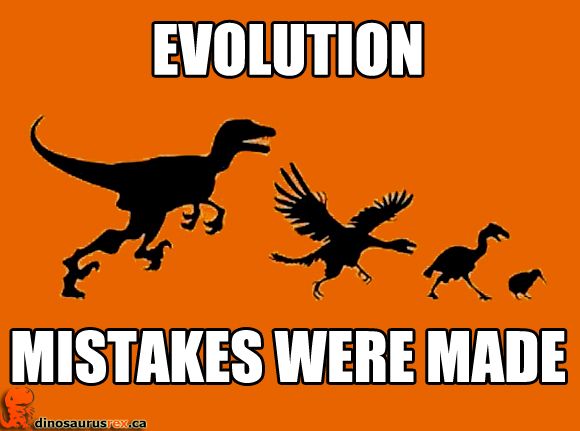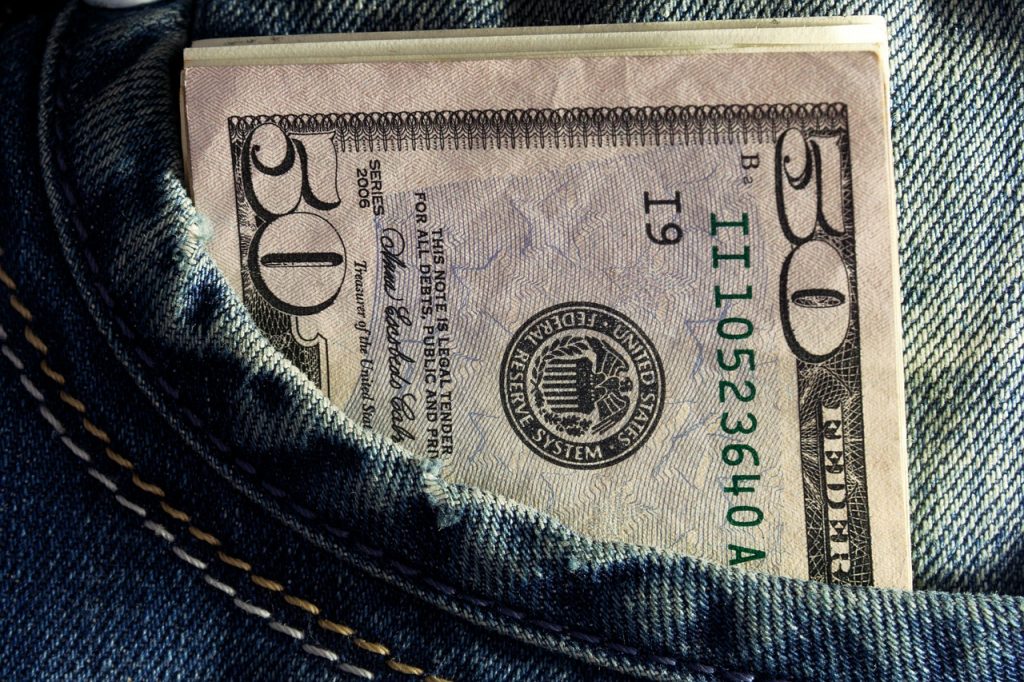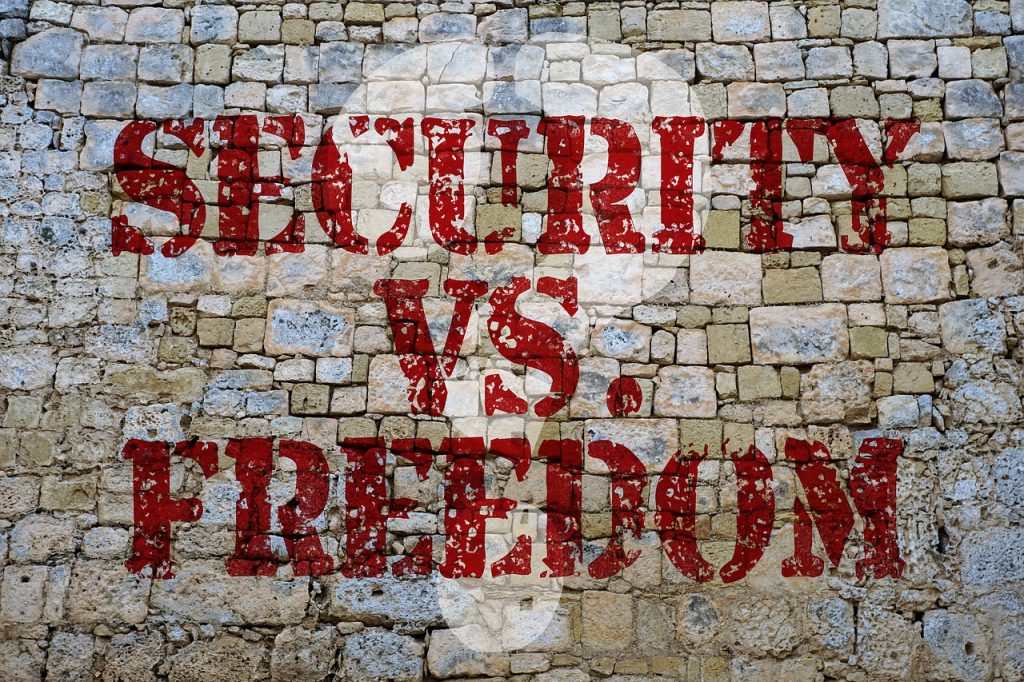The Jefferson-Madison Debates: To Pay, or Not to Pay…
June 12th, 2018 // 10:12 am @ Oliver DeMille
Tackling a Universal Basic Income
(Book Reviews: Annie Lowrey, 2018, Give People Money;
Richard Weaver, 1948, Ideas Have Consequences [2013 reprint])
“Neither parents nor children have any other prospects than what are founded upon industry, economy, and virtue…. Hence arises a spirit of universal activity, and enterprise in business…. No difficulty or hardship seems to discourage them.”
—Samuel Williams, History of Vermont, 1794
“Buy that latte and a child dies.”
—Esquire, The Money Issue, April 2016
Up or Down
I recently saw a cartoon that made me smile. If I remember correctly, it portrayed a Raptor on the left, an ostrich-like creature in the middle, and a chicken [Editor: Kiwi, actually?] on the right. The caption read:
EVOLUTION
MISTAKES WERE MADE
 I laughed pretty hard. If evolution really did go from raptors to chickens, Darwin’s survival of the fittest and natural selection leave a lot of questions. Funny.
I laughed pretty hard. If evolution really did go from raptors to chickens, Darwin’s survival of the fittest and natural selection leave a lot of questions. Funny.
A similar energy frequently invades modern public policy. Far too many government programs seem to accept that if we have the right goals in mind, if our heart is in the right place and we’re really trying to fix things, it doesn’t matter much if we legislate in a way that will actually solve the problems. Just trying is, apparently, enough.
For example, we want better education for our youth, but if throwing more money at public schools would really fix the problem, we’d be ahead of Japan, the United Kingdom and Switzerland in language, math, and science. In fact, the U.S. ranks 17th overall among industrialized nations (Source: Ranking America), and while we rank first in expenditures per student (over $12,000 per year for each high school student), American 15-year-olds score 31st in math literacy and 23rd in science (Source: CBSnews.com). Clearly something more than additional funding is needed—like a re-emphasis on real teaching, which means mentored personalization for each student. Instead, government programs keep throwing more money at schools in ways that don’t help, as if trying harder is somehow good policy.
Likewise, if passing tougher gun laws would seriously solve or even significantly reduce violent crime, they might make sense. But since the statistics clearly show that such laws don’t fix the problem (criminals don’t really follow them, after all), why are we still even debating the topic? Why is it a good idea to have the law-abiding citizens unarmed and the criminals armed to the teeth—as a direct result of government policy—is pretty much mindboggling. But at least somebody is trying, right?
Better than Bad
 One more example: if we really could significantly reduce the cost of health care for everyone, and at the same time insure everyone, keep the same doctor, and keep the same healthcare provider, who wouldn’t want that? But Obamacare was promoted and passed even though many of the experts warned of exactly what happened—premiums skyrocketed, many people had to change their healthcare providers, a lot of companies and states pulled out, and a lot of people couldn’t keep their doctor. “We had to try, though, didn’t we?” Some Americans apparently still think this is a sound basis for government policy. We subscribe to the kindergarten mentality of “‘A’ for effort,” or “‘A’ for intention” –regardless of principles or outcomes.
One more example: if we really could significantly reduce the cost of health care for everyone, and at the same time insure everyone, keep the same doctor, and keep the same healthcare provider, who wouldn’t want that? But Obamacare was promoted and passed even though many of the experts warned of exactly what happened—premiums skyrocketed, many people had to change their healthcare providers, a lot of companies and states pulled out, and a lot of people couldn’t keep their doctor. “We had to try, though, didn’t we?” Some Americans apparently still think this is a sound basis for government policy. We subscribe to the kindergarten mentality of “‘A’ for effort,” or “‘A’ for intention” –regardless of principles or outcomes.
In short, when we don’t understand human nature, we make mistakes. Numerous governmental attempts to solve our problems could be labeled:
GOVERNMENT PROGRAM
MISTAKES WERE MADE
This time nobody’s laughing though, maybe because we realize that we are the chickens in the cartoon. And if you’ll forgive a mixed metaphor, now: Not a lot of people like being guinea pigs. We need a better standard for government policy than “But we have to try! It’s such a big problem, so even bad policy is better than no policy.”
And yet: Not so. Government policies sometimes make things worse, not better.
Part II
“Do you see the necessity of accepting duties
before you begin to talk of freedoms?
These things will be very hard,
they will call for deep reformation.”
—Richard Weaver, Ideas Have Consequences, 1948
“You need $1,000 today. How to get it.”
—Headline in Esquire, The Money Issue, April 2016
Open Account, Open Mind
 Which brings us to a very important topic: A Universal Basic Income (UBI). The UBI has been recommended in one form or another by Mark Zuckerberg, Richard Branson, Ray Kurzweil, Bernie Sanders and others, and now Annie Lowrey’s new book Give People Money makes an energetic case for it. Lowrey’s subtitle outlines the major perceived benefits of the program: “How a Universal Basic Income Would End Poverty, Revolutionize Work, and Remake the World”.
Which brings us to a very important topic: A Universal Basic Income (UBI). The UBI has been recommended in one form or another by Mark Zuckerberg, Richard Branson, Ray Kurzweil, Bernie Sanders and others, and now Annie Lowrey’s new book Give People Money makes an energetic case for it. Lowrey’s subtitle outlines the major perceived benefits of the program: “How a Universal Basic Income Would End Poverty, Revolutionize Work, and Remake the World”.
“Imagine if every month the government deposited $1,000 into your checking account,” suggests the ad copy for Give People Money, “with nothing expected in return.” Interesting. Nothing expected in return? What about the taxes needed to fund the $1K per person across the nation, or the globe? That’s actually quite a significant expectation.
But I digress. Let’s keep an open mind and listen to Lowrey’s proposal. After all, even arch-conservative/libertarian thinkers Milton Friedman and Friedrich Hayek made a case for a Universal Basic Income, or something like it.
Hayek said:
“The assurance of a certain minimum income for everyone, or a sort of floor below which nobody need fall even when he is unable to provide for himself, appears not only to be a wholly legitimate protection against a risk common to all, but a necessary part of the great society in which the individual no longer has specific claims on the members of the particular small group into which he was born.”
Friedman suggested that in times of economic stagnancy, when consumers aren’t spending and producers aren’t creating, it might be prudent to jumpstart the economy by “helicoptering.” This consists of dumping large amounts of cash from helicopters, allowing people to pick up the money and spend it—thus rebooting business. Of course, the actual idea behind “helicoptering” was to deposit a predetermined amount of money into the bank accounts of large numbers of people, those making less than a certain amount of money, not actually throwing cash from helicopters. While this plan focused on a one-time event, not a monthly deposit like most Universal Basic Income proposals, the principles are reminiscent.
Ends and Beginnings
 To many conservatives, it makes sense that liberals, progressives, and socialists would endorse the idea of a Universal Income. But the same basic support from both Hayek and Milton Friedman is a head-scratcher.
To many conservatives, it makes sense that liberals, progressives, and socialists would endorse the idea of a Universal Income. But the same basic support from both Hayek and Milton Friedman is a head-scratcher.
In context, Hayek seems to have made this proposal as an alternative to entrenched socialism: a system where most or all of the jobs are controlled and distributed by government. In such an environment, a Universal Income would actually provide the opportunity for a budding free market, a chance for entrepreneurship, or “to relocate” to another nation with more freedom. (See Matt Zwolinski, “Why Did Hayek Support a Basic Income?” Libertariansim.org).
Lowrey’s proposal, in contrast to Hayek, is set in our current world. Or, more precisely, in a better world built on this one. The benefits of the program would be, mainly:
*End systemic poverty. By “hacking poverty”, we could eliminate much of the suffering and dead-end misery in the world (or nation). (Give People Money) Those who want more than the $1,000 per month, or whatever the UBI is, could work more or build a business, etc.—just like many people do now. But those who choose otherwise would at least have a basic living.
*Emphasize individual purpose. People could focus on doing work they love, rather than being tossed about by the cold demands of market forces. Individuals could emphasize their life purpose, and spend their days doing things they really care about. No more “crummy jobs.” (Ibid.) This might even help create a “groovy, Trekkie post-capitalist world without work”. (Ibid.)
*Improve social justice. It might even help nudge the world towards truly solving the problems of social injustice. “A UBI” Lowrey says, “would undercut the basis of such judgments [including racial, class, and gender discriminations] and be a powerful force for human dignity.” (Ibid.) It would also acknowledge “that our market economy leaves people out and behind, creating poverty and punishing individuals who cannot or are not working for an employer…. It would acknowledge our interdependence as well as our independence.” (Ibid.)
*Increase and spread freedom. Lowrey: “A universal, unrestricted cash benefit—just giving people money—would promote the ‘true individual freedom’ that comes from ‘economic security and independence’ as Roosevelt argued seventy years ago.” (Ibid.)
Into Reality
 Most people—whatever their political leanings—can agree with the goals of ending poverty, emphasizing individual purpose in life, improving social justice for everyone, and increasing/spreading freedom. Personally, I don’t know anyone who is against these 4 things. The devil, the cliché promises, is in the details. The disagreement turns on how to accomplish such ideals. Conservatives, libertarians, liberals and progressives, not to mention socialists, anarchists, communists, mercantilists, humanists, distributists, originalists and Keynesians have long pointed out the flaws in each others’ proposals. How indeed can such goals be realized? Or, as Nietszche often quipped: “How now?”
Most people—whatever their political leanings—can agree with the goals of ending poverty, emphasizing individual purpose in life, improving social justice for everyone, and increasing/spreading freedom. Personally, I don’t know anyone who is against these 4 things. The devil, the cliché promises, is in the details. The disagreement turns on how to accomplish such ideals. Conservatives, libertarians, liberals and progressives, not to mention socialists, anarchists, communists, mercantilists, humanists, distributists, originalists and Keynesians have long pointed out the flaws in each others’ proposals. How indeed can such goals be realized? Or, as Nietszche often quipped: “How now?”
It’s one thing to have a dream; quite another to implement it effectively—in a way that both works and lasts. Lowrey, fortunately, gives us specifics: She wrote: “Providing a $1,000-a-month UBI to every American citizen would mean spending something like an additional $3.9 trillion a year. This is equivalent to a fifth of the American economy—and equal to every penny the federal government currently spends, on everything from building bridges to fighting wars to caring for the elderly to prosecuting crimes to protecting wetlands.” (Ibid.)
The obvious first question is: Who’s going to pay for this? Lowry: “The top 1 percent of earners pay about 40 percent of all income taxes, which comes to about $600 billion a year. You could tax away every penny they earned, and it would still not come close to paying for a full-fat UBI in other words.” (Ibid.)
Not a good start. But, Lowrey points out: “Eliminating or trimming back other programs would help defray the expense. Right now, the government spends roughly $2.7 trillion on its social-insurance programs…. Still, a $1,000-a-month benefit, or a smaller one, would require new spending and likely new sources of revenue, regardless of how deep other budgets were cut…. Giving the same thing to everyone means spreading the butter a lot thinner, meaning that we need more butter.” (Ibid.)
She identifies some of the major criticisms of a UBI, but suggests that “the knee-jerk opposition to some form of a UBI—crying that it is too expensive or unrealistic—feels over-wrought. Raising enough revenue for a $1,000-a-month UBI is more a matter of will than of mathematics, and would bring the United States’ tax burden in line with that of the European social democracies…. Creating a top tax bracket at 55 percent, instituting a modest wealth tax, ending the mortgage interest deduction, implementing a value-added tax—proposals like those would get us there.” (Ibid.) She further argues that since the U.S. government prints its own money, “dollars are not something the United States government can run out of.” (Ibid.) [Editor coughs and sputters…]
Lowrey is quick to add that the government shouldn’t print so much money as to cause rampant inflation, but still, she maintains, government debts, deficits, and a bit of inflation aren’t the worst things in the world. A UBI is worth it, she seems to suggest. But her easy approach to the math is…well…you decide: “A financial transactions tax would raise an estimated $100 billion to $400 billion a year. A value-added tax could easily raise a trillion dollars. A well-designed carbon tax would raise about $100 billion a year. Moreover, a wealth tax, such as a hefty levy on estates over $3 million, could raise hundreds of billions.” (Ibid.) Taxes on robots are also a possibility, Lowrey suggests, as are Negative Income Taxes where the IRS sends monthly checks to everyone below the poverty level. (Ibid.)
Where? How?
 On a personal level, I was very excited to read the section on “how” to fund a UBI. After reading over three-fourths of the book and its very interesting examples and ideas about UBI economics, I was thrilled to finally get to the nitty-gritty of the plan. The finances. But…it never came. The paragraph above was as close as it got. Granted, these are interesting ideas about funding a UBI, but there is no actual detailed proposal in this book. Disappointing, to say the least.
On a personal level, I was very excited to read the section on “how” to fund a UBI. After reading over three-fourths of the book and its very interesting examples and ideas about UBI economics, I was thrilled to finally get to the nitty-gritty of the plan. The finances. But…it never came. The paragraph above was as close as it got. Granted, these are interesting ideas about funding a UBI, but there is no actual detailed proposal in this book. Disappointing, to say the least.
In fairness, perhaps a specific plan for a UBI wasn’t Lowrey’s point—such a plan might detract from her real goal, which was to promote the idea of implementing a UBI. The plan can come later. Or, possibly, she has such a plan but felt that this book should emphasize the benefits of the idea, not get people caught up in the details of just one way to do this. Wise choice, perhaps.
Still, without a specific plan, without real numbers, how can we assess the efficacy of pursuing a UBI? “We have to try” simply isn’t good enough. Especially when the numbers are so fuzzy. For example, a carbon tax might “raise about a $100 billion a year”, but how would the same tax reduce revenues from other segments of the economy—with profits impacted by energy prices? Increased fuel prices caused by such a tax would impact almost every sector of the economy. And, yes, a “value-added tax” might “easily raise a trillion dollars”, but this is a gross total, not net. The impact would be huge, and not all for good.
Likewise, even if everything Lowrey says about increased taxes is true, what is the net impact of “[c]reating a top tax bracket at 55 percent, instituting a modest wealth tax, ending the mortgage interest deduction,” etc.? What, precisely, is a “modest wealth tax”? Modest by what standard? And how does such a tax impact charities, philanthropies, and those who receive inheritances? True, Lowrey’s point is that there are ways to increase taxes—and thereby pay for a UBI—but she says little about how such increases will redirect and redistribute money. Or even if any (or all) of these increases will boost or weaken the overall economy. If GDP actually declines, the source of UBI funding will dry up, or at least diminish—while the amount required to send out $1,000-per-month naturally goes up with population.
For the Future
 I actually really like Give People Money—it is well-written, enjoyable to read, full of interesting stories – sometimes fascinating, always thought-provoking. The research and quotes are excellent. Any book that features George Jetson in the same sentence as Marie Curie has my attention. By the way, I spent three very enjoyable hours just reading the endnotes and looking up articles and sources that sparked my interest. Fascinating! I’m a Lowrey fan.
I actually really like Give People Money—it is well-written, enjoyable to read, full of interesting stories – sometimes fascinating, always thought-provoking. The research and quotes are excellent. Any book that features George Jetson in the same sentence as Marie Curie has my attention. By the way, I spent three very enjoyable hours just reading the endnotes and looking up articles and sources that sparked my interest. Fascinating! I’m a Lowrey fan.
In short, I recommend the book. It’s a great read, a fun trip into economic comparisons—from Keynes to Hunger Games to Maslow’s hierarchy to Ford trucks, AI and Silicon Valley. But I didn’t come away from it with any sense that a UBI is realistic. Intriguing, yes. Thought-provoking, yes. Realistic, no. Fundable, possibly—in the short term; but what about the lasting impact?
There is another proposal of this type that is worth considering. Charles Murray has suggested that every adult receive $10,000 per year and that all other welfare-state programs be discontinued. (See In Our Hands; see also “A Guaranteed Income for Every American,” Wall Street Journal) This would cost taxpayers less than the current safety net, some argue, and it would put decisions in the hands of the actual people. Clearly a lot of government waste and misuse of funds would also be eliminated.
The key to this proposal is that it would end all other government social-insurance programs, departments, polices and expenses. Interestingly, most of the criticism against Murray’s plan, nearly all from liberals and the Left, emphasizes that it is financially infeasible. According to Murray’s own numbers, there is a $355 billion shortfall the first year. (Ibid.)
Murray suggests that the gap would be closed, eventually, as the population rises with upcoming generations. Still, the transition costs of, at least for a time, funding both the Social Security/Medicare/Medicaid model and also $10K a year to adults make the program unrealistic—as Murray himself says. But if we continue with our current system, he argues, it’s going to financially collapse anyway—better to get the ball rolling on a system that eventually will work.
Part III
“Arrival of the Fittest”
—Chevrolet/Corvette ad
“How to lead experiments that actually work”.
—Harvard Business Review
From the Starting Point
 But here’s the real challenge—for all UBI-style proposals, from Lowrey to Hayek to Murray. Would a Universal Basic Income even be good for people? Is it compatible with human society and culture, human needs, human potential?
But here’s the real challenge—for all UBI-style proposals, from Lowrey to Hayek to Murray. Would a Universal Basic Income even be good for people? Is it compatible with human society and culture, human needs, human potential?
This is a big question. The most important question. At first blush, most people would like a check for $1,000 a month. Why not? A number of people could desperately use it. But what is not seen in this arrangement? Such a challenging question demands that we address what Aristotle called first things, or primary goods. First principles. The most basic foundations of human understanding are indeed vitally important, and take us back to the poignant question asked by philosophers, prophets, economists and political sages:
To be human is to ______________. ???
The word we use to fill in the blank tells us a great deal about how we view the world. The original liberal answer, articulated most clearly by thinkers like Hobbes and Rousseau, was: To be human is to suffer. In contrast, the conservative answer, from Aristotle to Adam Smith, was: To be human is to struggle.
There are, of course, other views. Shakespeare suggested that To be human is to err, The Romantics answered that To be human is to love, and the German Trifecta of Hegel, Marx and Nietszche argued that To be human is to fight and win—emphasis on win. But the initial debate between suffer and struggle remains at the center of today’s great conversation.
See Both Sides
The first approach makes the following case:
- human life is suffering
- it is up to all of us to lessen suffering as much as possible
- to do this, we need a great deal of power
- government is the entity most likely to obtain and use power in a way that greatly lessens human suffering in the world
- we should actively help grow the power and reach of government everywhere
In short: Liberalism.
The second view takes a different tack:
- the purpose of life is to struggle against all odds for goodness, righteousness, and progress
- this is best done by individuals alone and individuals voluntarily working in groups
- institutions that help individuals in this process are useful, but institutions must be carefully watched and limited because they frequently become distractions or even roadblocks to real progress
- ultimately the great, noble struggle of humans on this earth is threefold—to serve and help others in this life, to improve oneself in ways that make the world better, and in doing these first two things to prepare for better things in the life to come
To wit: Conservatism.
Richard Weaver argued that while the Progressive path tries to make life easier for everyone and institutionalize it for all, Conservatism programs attempts to help everyone more bravely and effectively embrace the path of hard things. (See Ideas Have Consequences). He taught that programs designed mainly to spread ease, especially forced attempts by government, were beneath the dignity and potential of mankind.
Today’s Goal
 Weaver wrote of modern efforts to make everything easier for everyone, calling out people for promoting a life based on “Loving comfort, risking little, terrified by the thought of change…” He called this the “spoiled child psychology”, exhibited by too many adults in the modern world. The best, and worst, example of this, he said, is the widespread sense of entitlement among so many modern citizens.
Weaver wrote of modern efforts to make everything easier for everyone, calling out people for promoting a life based on “Loving comfort, risking little, terrified by the thought of change…” He called this the “spoiled child psychology”, exhibited by too many adults in the modern world. The best, and worst, example of this, he said, is the widespread sense of entitlement among so many modern citizens.
He spoke most forcefully against those who discourage lives of strenuous work, facing and overcoming challenges, struggling-failing-and-continuing-to-struggle. Such work, hard and continuous, is what life is about, Weaver taught. It is why we were born. To do things. Hard things. Alone. Together. Because work matters. And because lives of work and struggle are dignified, meaningful, and very often happy lives. We were not, he assures us, born to bask in lives of ease provided by bureaucrats or aristocrats or anyone else. Such a path he considered worthless.
These are, ironically, hard words—especially to modern ears. “Like Macbeth,” Weaver wrote, “Western man made an evil decision, which has become the efficient and final cause of other evil decisions. Have we forgotten our encounter with the witches on the heath? It occurred in the late fourteenth century, and what the witches said…was that man could realize himself more fully if he would abandon his belief in the existence of transcendentals.” (Ibid.) The witches’ solution: Stop seeing life as the battle to seek heaven, and start fixing this earth, through manmade institutions and government power. (Ibid.)
The result of this shift, from “embracing a life of struggle” to “a life of suffering and trying to institutionally force the end of suffering”, began our journey to what Weaver terms “modern decadence”. (Ibid.) In the drive to avoid and forcefully eliminate all suffering, to find the easy way and help our children seek even easier ways, most people turned to materialism. Away from service, and more to amassing money and things—as hedges against potential suffering. As Weaver put it: “Man created in the divine image, the protagonist of a great drama in which his soul was at stake, was replaced by man the wealth-seeking and-consuming animal.” (Ibid.)
It turns out that while a belief in struggle led many people to work and serve humanity, a greater faith in suffering drives most toward materialism. Ironic. An even deeper irony followed: the philosophy of suffering as the great evil spawned a culture of seeking ease through material success, and this in turn created a focus on ease itself. The work motivated by materialism gave way to the work of finding ways to avoid work. Profound. In Weaver’s words: “a carnival of specialism, professionalism, and vocationalism…fostered and protected…strange bureaucratic devices.” (Ibid.) The new mantra: government must make things easier for everyone.
Shifting
 Is it any surprise that today’s generation of youth—considered by many an embodiment of a sixth human sense of entitlement—are often referred to as Snowflakes? “We should be taken care of by the government” is a popular view. “Or if not by government, then by somebody. Anybody…”
Is it any surprise that today’s generation of youth—considered by many an embodiment of a sixth human sense of entitlement—are often referred to as Snowflakes? “We should be taken care of by the government” is a popular view. “Or if not by government, then by somebody. Anybody…”
“Otherwise, how will our lives be easy?”
In reality, this view extends far beyond any one generation. Weaver said modern society is replacing homo sapiens with homo faber—meaning from “wise humans” to “humans engineered by architects, by experts”. (Ibid.) From freemen to slaves. Weaver’s connection of “the easy life” to “slavery” is interesting. Certainly a life in slavery is not easy, but only those who engage the true struggle of life can remain truly free. And the struggle is hard, not easy. Period. Those who seek lives of ease unwittingly take the path toward slavery.
As conservatives know: “If it is easy, beware…” In most cases, Easy Education, Easy Citizenship, Easy Career = Mediocre Education, Government by Elites, Middling Income. What, then, would Weaver say of a Universal Basic Income?
He wrote:
“The egotism of work increasingly poses the problem of what source will procure sufficient discipline to hold men to production. When each becomes his own taskmaster and regards work as a curse which he endures only to gain means of subsistence, will he not constantly seek to avoid it?” (Ibid.)
And what will such a man or woman do when money arrives each month and no work is required?
A few people, when work is no longer asked of them, will turn their efforts to service, art, or other areas of interest. Some will follow a great passion or goal they’ve long wanted to pursue. But what actually happens is well documented. The majority of people, when suddenly retired, laid off, recipients of the lottery, or otherwise released from daily work, struggle to fill their time with things that bring happiness. Note that this is the wrong kind of struggle.
Many such people soon find their newfound free time “accompanied by intensive explorations of the individual consciousness, with self-laceration and self-pity.” (Ibid.) They frequently turn “inward and there discover…an appalling well of melancholy and unhappiness…” (Ibid.) Weaver used these words to describe certain writers who embodied this view; but if Weaver’s words are a bit too flowery, they aren’t inaccurate. Many people find retirement, unemployment, or just lots of free time unsatisfactory and frustrating.
Reaching for Greatness
 A 2015 report in The Atlantic noted: “The jobless don’t spend their time socializing or taking up new hobbies. Instead, they watch TV or sleep…. Two of the most common side effects of unemployment are loneliness, on the individual level, and the hollowing-out of community pride.” (Derek Thompson, “A World Without Work”)
A 2015 report in The Atlantic noted: “The jobless don’t spend their time socializing or taking up new hobbies. Instead, they watch TV or sleep…. Two of the most common side effects of unemployment are loneliness, on the individual level, and the hollowing-out of community pride.” (Derek Thompson, “A World Without Work”)
For many people, it turns out that “easy” is unfulfilling, in the same way that achieving something hard is one of the most rewarding things human beings ever experience. Words such as victory, accomplishment, triumph, success, progress, improvement, and even happiness, defy definition and mean very little unless they are preceded by difficulty and hard work. The greater the struggle, in fact, the greater the victory. Thomas Paine made this a central theme in his writings.
The truth is that the reality flies in the face of modern thinking. Specifically, most people want hard, even if they don’t realize it. Without hard, most people simply aren’t happy. It turns out that hard isn’t always equal to suffering, but it is in fact a vital component of happy. “Easy” is nice as a vacation, but it isn’t the basis of a good life. “Hard” can be such a basis, as long as it is accompanied by freedom—or at least the opportunity to gain freedom.
As for a Universal Basic Income, the jury is still out. If people don’t have to work for their basic living, some will argue, they’ll work for other things—better things. This is certainly true of some people, and it may be true for many more. That said: It is definitely not true of everyone. Whether it is true for enough people to make it worth adopting as public policy will likely be debated for many years to come. But the promise of a UBI, that it will significantly reduce human suffering, naturally sounds good to many moderns but sparks immediate skepticism in those who embrace the historical reality of human nature. Humanity has proven, many times, that hard challenges, within reason, are nearly always better for people than lasting times of ease.
I have my doubts that a UBI will do much to fix the actual problem. It could easily do the opposite: when a lot more people aren’t working, some of them might use their time in ways that hurt others and increase suffering. This is certainly a possibility.
Pushing Riding Forward
 Modern man, Weaver pointed out, has: “been given the notion that progress is automatic” that he/she has not just a right to pursue happiness but “a right to have happiness”, regardless of what he does, or doesn’t do. (Ideas Have Consequences) He has been told that someone else is responsible for his happiness, and that if he is sad, or unfulfilled, someone else is to blame. (Ibid.) He has been informed that if he feels frustration, some superior “in the hierarchy” has “practiced an imposition upon him”. (Ibid.)
Modern man, Weaver pointed out, has: “been given the notion that progress is automatic” that he/she has not just a right to pursue happiness but “a right to have happiness”, regardless of what he does, or doesn’t do. (Ideas Have Consequences) He has been told that someone else is responsible for his happiness, and that if he is sad, or unfulfilled, someone else is to blame. (Ibid.) He has been informed that if he feels frustration, some superior “in the hierarchy” has “practiced an imposition upon him”. (Ibid.)
“The truth is,” Weaver said, “that he has never been brought to see what it is to be a man…. [T]hat he really owes thanks for the pulling and tugging that allow him to grow…. This citizen is now the child of indulgent parents who pamper his appetites and inflate his egotism until he is unfitted for struggle of any kind.” (Ibid.) And the following zinger:
“The spoiling of man seems always to begin when urban living predominates over rural.” (Ibid.)
Is it lost on anyone that this is directly related to Blue State/Red State culture?
“In effect,” Weaver continues, “what modern man is being told is that the world owes him a living. He assents the more readily for being told in a roundabout way, which is that science owes him a living.” (Ibid.) “An artificial environment causes him to lose sight of the great system not subject to man’s control.” (Ibid.) Indeed, his moral and ethical senses are shaped by newspapers more than prayers, to paraphrase Nietszche.
What does that “great system” say about work? Easy versus hard? Individual responsibility versus institutions? If we push aside the culture of newspapers and instant mobile news updates for a moment, and instead ask the kind of questions obvious in a culture based on the idea that “humans thrive in the hard struggle,” we find ourselves dealing with bigger issues:
- Is pay without work good for the soul?
- Is it good for family life, or is it more likely to hurt families?
- Will it naturally render adults more child-like, dependent?
- And, since the pay actually comes from the work of someone else, are we simply taking from their work and accepting it without recompense?
- What does the fact that they are forced to pay this money say about those who accept it?
- Can a people remain free under such an arrangement?
Building or Breaking
 These are big questions. Unlike most modern policy debates, these big questions ignore the small talk and get to the real point. For some, this is distracting. “That’s not how it’s done,” scolds many a modern expert. But the truth is still relevant, right? Big realities do matter.
These are big questions. Unlike most modern policy debates, these big questions ignore the small talk and get to the real point. For some, this is distracting. “That’s not how it’s done,” scolds many a modern expert. But the truth is still relevant, right? Big realities do matter.
The view of human life as a great struggle for goodness puts each citizen forward as a potential hero. But the hero’s currency, Weaver notes, is “exertion, self-denial, endurance”, while “the spoiled child” wants everyone to be protected from hard things—especially making a living. (Ibid.) Preferably, in this latter view, such protection will come from government—the regime as supreme being, the end-all of suffering, the all-powerful state.
To be clear, a society of people who seek $1,000 (or other) payments from the government, not for work but just because they need or want it, is not on a path to freedom—or even to maintaining the freedoms they already enjoy. Speaking of payments from the government, the following story is related by Weaver in Ideas Have Consequences:
“During the early part of the second World War there came to light the story of a farmer from the back country of Oklahoma—one of the yet unspoiled—who, upon hearing of the attack on Pearl Harbor, departed with his wife to the West Coast to work in the shipyards…. [T]he new worker did not understand the meaning of the little slip of paper handed him once a week. It was not until he had accumulated over a thousand dollars in checks that he found out that he was being paid to save his country. He had assumed that when the country is in danger, everyone helps out, and helping out means giving.”
The Spiral
Also from Weaver:
“The past shows unvaryingly that when a people’s freedom disappears, it goes not with a bang, but in silence amid the comfort of being cared for…. If freedom is not found accompanied by a willingness to resist, and to reject favors [from the government], it will not long be found at all.”
Easy kills.
Hard is the future.
But those on the side of freedom embrace the struggle.
This is hard doctrine, no doubt. But it is the doctrine of a free people, and those who would remain free. Those seeking the way of ease will not, by definition, choose freedom—or fight for it when needed. Freedom is hard. Those searching for ever-easier paths will vote for more government, and when unearned $1,000 checks arrive each month to reward their search, a majority will do what makes the most sense in such a situation: vote for candidates who promise to increase the checks to $1,200 then $1,500 then $2,100…and more. Government will increasingly apply more force to the productive individuals and organizations in society, and everyone else as well.
No free society can weather—financially, politically, or morally—such an electorate.
Ever.
“Freedom is a fragile thing and is never more than one generation away from extinction. It is not ours by inheritance; it must be fought for and defended constantly by each generation, for it comes only once to a people. Those who have known freedom and then lost it have never known it again.”
—Ronald Reagan
Suggested Readings
- An important article that addresses the future of work, a basic universal income, and recent trends in technology and employment—Derek Thompson, “A World Without Work,” The Atlantic, July/August 2015
- Daniel Pink, A Whole New Mind
- Joshua Cooper Ramo, Seventh Sense
- Virgil, Georgics
- Victor Davis Hansen, The Other Greeks
Category : Blog &Book Reviews &Citizenship &Community &Constitution &Culture &Current Events &Economics &Generations &Government &History &Information Age &Leadership &Liberty &Politics &Service &Statesmanship













Tom
7 years ago
UBI is little more than an extension of the minimum wage. Only extending it to nonproductive people. And just like the minimum wage, it is absolutely inflationary by definition.
Inflation is by definition of an increase in the money supply. Printing money and handing it out by a government program such as defense or infrastructure, is only different in tactic not strategy or ultimate result of UBI. Both are inflationary.
Minimum wage increase means more costs to the business. Which they pass on in raised prices to the consumer. After a short period of time, the minimum wage earner is still on the bottom because EVERYTHING costs more money to attain.
Inflation in a closed loop is easier to see how increasing the money supply works. The analogy is you have say 500 people in a closed room where they are auctioning off artwork. Say a famous painting. The room would bid up the price to say $1,000. Yet that exact same artwork, if every person was handed $500 as they walked into the auction room would have a different result. Rather than topping out at $1,000. It would attain a much higher price. Possibkyall the way to the $1,500. But what changed? The item is EXACTLY the same painting. So intrinsically it has no different value. Yet it required more currency dollars to purchase it. ONLY because of increased money supply.
UBI has EXACTLY the same effect. Pouring money into society whether through government contracts or direct cash handouts to individual citizens has the exact same effect. Massive inflation and after short term benefit UNTIL, the economy adjusts to the new money supply. And rhe suffering of the poor remains. Just like the cyclical minimum wage cycle. It is a dog chasing its tail!
And as you so clearly point out. This is not considering ANY mental or human behavioral disturbances. Such as the business shutting down because they are taxed to oblivian. Why do that hard work for little to no gain when they could instead just stay home and collect the “free” government UBI cash?
Robbing Peter to pay Paul, John, Mary and Barbra is all well and fine. UNTIL Peter runs out of money! And It won’t take Peter long to quit working when he is robbed blind every day to pay his neighbors UBI.
Another analogy to indicate the human spirit and the need to do hard things to be happy. A fly fisherman dies and goes the the great beyond. He is happy to find himself in a beautiful mountsin setting with anperfect crystal clear trout stream. And a beautiful fly rod and tackle box full of the best fly’s. He takes the rod and fly and casts is out into the stream. And in seconds he pulls out the biggest trout he has ever seen. He is beside himself happy that he has clearly gone to paradise! He puts the fish into his basket and proceeds to cast the fly again into the crystal clear stream. And to his amazement he again catches an even bigger more beautiful trout. He is giddy now. BUT. He again casts the fly into the stream. And again, and again. And each and every time he casts, he pulls in a whopper of a trout. After a time he doesn’t even put a fly on the fihsimg line. He simply tosses a bare fishhook 3 feet in fromt of him and again catches a knockout record trout. The fisherman realizes that he is not in heaven, but in hell. He finds no enjoyment because there is no challenge. It become boring and drudgery with nothing to look forward to.
We as humans are not sustained in fulfillment if there is no challenge. Even in sports if we win without effort the victory is cheap and unfulfilling. It is only in the hard work the dream struggle and VICTORY, that we can truly rejoice and be happy in the victory. Without the struggle and the work, the victory is just not sweet.
Do you really think that the gold medal winner in the olympics is crying on the podium because it was easy? Or was it because it was hard? And it was the hard work that made that moment worth it!